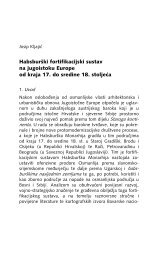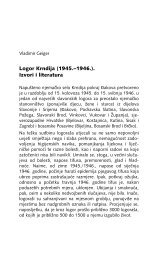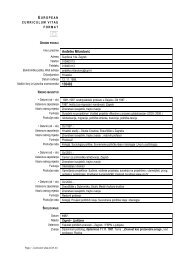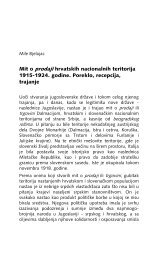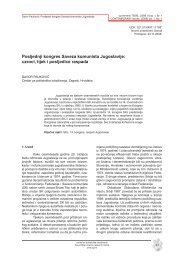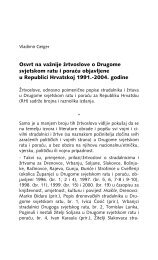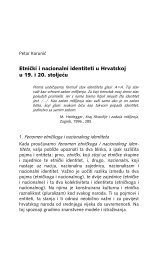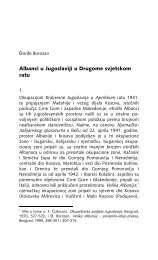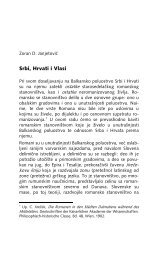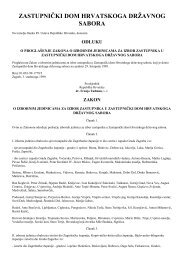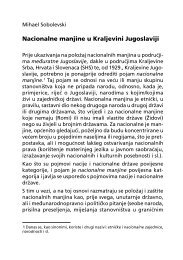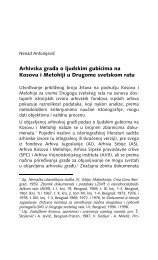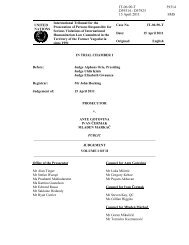ISSN 1847-2397 godište II broj 1 2009. | volume II number 1 2009
ISSN 1847-2397 godište II broj 1 2009. | volume II number 1 2009
ISSN 1847-2397 godište II broj 1 2009. | volume II number 1 2009
- No tags were found...
You also want an ePaper? Increase the reach of your titles
YUMPU automatically turns print PDFs into web optimized ePapers that Google loves.
Maja Sahadžić: The Electoral System of Bosnia and Herzegovinasuvremene TEME, (<strong><strong>2009</strong>.</strong>) God. 2, Br. 1CONTEMPORARY issues, (<strong>2009</strong>) Vol. 2, No. 1[General Framework Agreement for Peace] provisionsthat stand for issue politics and reconciliationand reject separatism and politics of exclusion.The final version was considerably toneddown from this ambitious intention, containingonly the uncontested provision banning ICTY[International Criminal Tribunal for the formerYugoslavia] – indicted war criminals to hold anyfunctional position in the candidate parties (Article1.6), and nothing in its Chapter 4 (Certificationand Candidacy for Elections) requiring partiesto present reconciliatory platforms or to havemultiethnic membership. With regard to this theoutcome of the last general elections is a hardlysurprising indication of both the strength of theexclusive nationalist appeal within the countryand the lack of potential for attracting politicianscapable of mustering voter’s support under thebanner of reconciliation and civic nationalism”(Bojkov, 2003:57).We emphasized earlier that this law didnot make any significant changes by comparisonto temporary electoral system based on DaytonPeace Accords. But, even if it did not provideconsiderable and distinctive transformation,Electoral Law of Bosnia and Herzegovina remainedwithin framework of Constitution of Bosniaand Herzegovina (Annex IV, Dayton PeaceAccords). Certain authors refer to “basic characteristicsof permanent electoral system” (Trnka,2006: 201-203) in Bosnia and Herzegovina:a) election of the Parliamentary Assemblyof Bosnia and Herzegovina and membersof the Presidency of Bosnia andHerzegovina has been regulated;b) 2/3 of members of the House of Representativesof the Parliamentary Assemblyand members of the Presidency ofBosnia and Herzegovina from the lineof Bosniak and Croat peoples are beingelected on territory of Federation of Bosniaand Herzegovina. 1/3 of membersof this house of parliament and memberof the Presidency of Bosnia and Herzegovinafrom the line of Serb peoples arebeing elected on territory of Republic ofSrpska;c) conditions for acquirement of right tovote has been also regulated;d) voters have right to vote in person or inabsence in municipality where they hadresidence according to 1991 populationcensus;e) a citizen of Bosnia and Herzegovinawho has dual citizenship have right tovote only if Bosnia and Herzegovina isthe country his or her permanent residence;f) person that was accused or sentencedby International Tribunal for former Yugoslaviafor serious violations of humanitarianlaw cannot be elected forany function on territory of Bosnia andHerzegovina;g) principle of incompatibility is regulated;h) cumulating of functions is disabled;i) mandate belongs to candidate not toparty or coalition on which list candidatewas;j) permanent terms for conduction of electionswere stipulated.If we take closer look at the list of basiccharacteristics we can make a short analysis ofpermanent electoral system in Bosnia and Herzegovina:Point (a) is referring to Article 1.1 ofElectoral Law of Bosnia and Herzegovina whichdefines that this law shall regulate the electionof members and delegates of the ParliamentaryAssembly of Bosnia and Herzegovina and of themembers of the Presidency of Bosnia and Herzegovinaand shall stipulate the principles governingthe elections at all levels of authority inBosnia and Herzegovina. On one side, it has tobe noted that precise regulations on this havebeen provided by entities. On the other side,Electoral Law of Bosnia and Herzegovina usedbroad approach in regulating principles whichnarrows range of entities regulation.Point (b) is referring to Article IV(2) andArticle V(1) of the Constitution of Bosnia andHerzegovina (Annex IV, Dayton Peace Accords)which are regulating election of the House ofRepresentatives of the Parliamentary Assemblyof Bosnia and Herzegovina and the Presidencyof Bosnia and Herzegovina. Consequence ofthis constitutional regulation is that all citizens ofBosnia and Herzegovina cannot elect all membersof those two. For disproportional <strong>number</strong>of voters, equal right to vote is doubtful. On theother side, this is not in accordance with 1950European Convention for the Protection of HumanRights and Fundamental Freedoms andits Protocols that shall apply directly in Bosniaand Herzegovina by Article <strong>II</strong>(2) of Constitutionof Bosnia and Herzegovina (Annex IV of DaytonPeace Accords) and Article 1.3 of ElectoralLaw which defined that election of members ofall bodies of government is based on free electionsand universal suffrage and equal right tocentar za politološka istraživanjathe political science research centrewww.cpi.hr68



